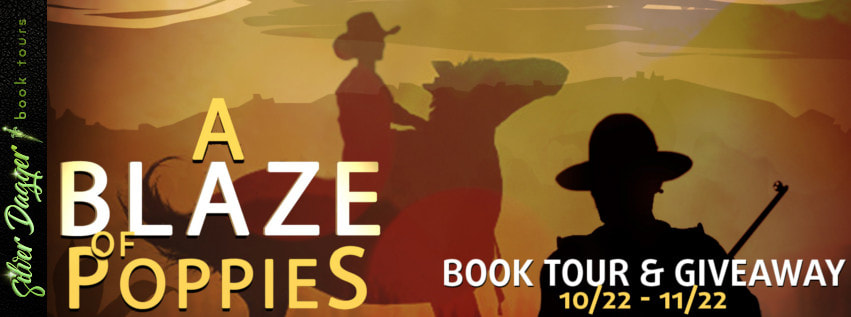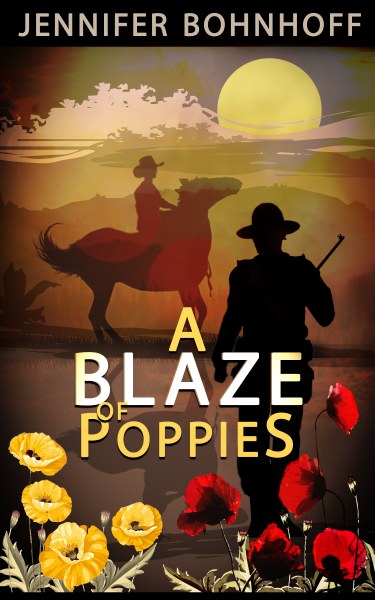by
Jennifer Bohnhoff
Genre:
Historical Romance, Women's Fiction
In
1916, Mexico is on the brink of revolution. Despite armed bandits
streaming over the border and prejudices against female ranchers,
feisty little Agnes Day is determined to keep the family ranch and
run it on her own terms. The last thing she wants is to fall under
the authority of a husband who will keep her from the land she loves.
Her
ally in the fight is Will Bowers, a strong and silent New Mexico
Guardsman assigned to nearby Camp Columbus under General Blackjack
Pershing, but Will hides a dark and disturbed background that stops
him from committing to any one or any place. Then the United States
enters World War I and both Agnes and Will are swept into
conflagration.
Can
Agnes secure a peaceful future on the Sunrise Ranch after the
insanity and bloodshed of war? Dare she hope to share that future
with someone else?
Goodreads
* Amazon
The Symbolism of Poppies
Although poppies are the birthday flower for those born in August, they are most frequently associated with World War I and remembering the soldiers who died during that war. The use of poppies as symbols of death is far older than the early twentieth century. It stretches far back, into ancient times.
Fallaner, CC BY-SA 4.0 <https://creativecommons.org/licenses/by-sa/4.0>, via Wikimedia Commons
The ancient Greeks connected poppies with sleep because of the sedative nature of its sap. After her daughter Persephone was abducted by Hades, the gods gave Demeter, the goddess of harvest, a poppy to help her sleep. Afterwards, poppies sprang from Demeter’s footsteps. She transformed her mortal lover, Mecon, into a poppy.
Morpheus, the Greek god of dreams, is frequently represented with poppies. The drug morphine, which is derived from poppies, got its name from Morpheus. Nyx, the god of night, is also associated with poppies. Hypnos, the god of sleep, and his twin brother Thanatos, the god of death, wore crowns of poppies.
HYPNOS AND THANATOS, SLEEP AND HIS HALF-BROTHER DEATH BY JOHN WILLIAM WATERHOUSE
Death and sleep have been intertwined concepts for a long time. In the Bible, Daniel 12:2 describes the dead as "those who sleep in the dust of the earth.” Shakespeare has Hamlet compare sleep to death (line 72). The Victorians decorated tombstones with poppies representing eternal sleep.
The association between poppies and sleep continues today. In The Wizard of Oz, Dorothy, Toto and two of her companions fall asleep crossing a field of poppies. In the movie version, the Witch of the West casts a spell over a poppy field. The book, however, explains that the field itself has the power to make cause sleep:
“They now came upon more and more of the big scarlet poppies, and fewer and fewer of the other flowers; and soon they found themselves in the midst of a great meadow of poppies. Now it is well known that when there are many of these flowers together their odor is so powerful that anyone who breathes it falls asleep, and if the sleeper is not carried away from the scent of the flowers he sleeps on and on forever. But Dorothy did not know this, nor could she get away from the bright red flowers that were everywhere about; so presently her eyes grew heavy and she felt she must sit down to rest and to sleep.” –L. Frank Baum, The Wizard of Oz
Poppies became associated with World War I because of a poem written by a Canadian doctor who was stationed in Belgium during the war. Lieutenant Colonel John McRae wrote In Flanders Fields, which talks about the poppies growing among the new grave markers, on May 3, 1915 after officiating at the funeral of his friend and brother in arms, Alexis Helmer. His poem was published in Punch Magazine and became an instant sensation.
Moina Michael, an American working at the YMCA Overseas War Secretaries Office in New York, read the poem and was so moved that she vowed to wear a poppy on her lapel to honor the men who had died in war. She bought silk poppies for her colleagues, then lobbied to have the poppy adopted as a symbol of national remembrance.
At the same time, a French woman Anna Guérin was also promoting silk poppies. The director of the “American and French Children’s League,” Ms. Guerin adopted the poppy as the charity’s emblem. The charity provided war veterans, women, and children with fabric to make artificial poppies, which were then sold to help fund the rebuilding of war-torn regions of France and to assist orphaned children. In Britain, a similar campaign raised money to help Veterans in find employment and housing.
The poppies that grew in the fields of Flanders were blood red. The poppies that grow in Southern New Mexico, when my novel A Blaze of Poppies begins and ends, are the bright yellow Mexican poppy. Southern New Mexico is part of the Chihuahuan Desert, the largest desert in North America. It receives between six and sixteen inches of rain a year. When the spring rains come, parts of the dry, brown desert explode into fields of brilliant yellow poppies. If red poppies remind man of sleep, death, and remembering the dead, the bright Mexican poppies must surely symbolize the renewal of life in all its brilliance and hope.
Agnes Day, the main character in A Blaze of Poppies begins her story on a ranch in the dry New Mexican desert. It leads her to the field hospitals of France, where she witnesses the death and destruction of war first hand. But it is poppies that blaze the trail back to her beloved ranch.
Jennifer Bohnhoff is a former history teacher who lives in the mountains of central New Mexico. Her novel A Blaze of Poppies is due out in October, 2021.
A
lifelong New Mexican, Jennifer Bohnhoff loves travel and history, so
it should come as no surprise that many of her books are historical
novels set in beautiful or interesting places.
She
taught Middle School Language Arts and New Mexico History for years,
but has left to become a full time author. She loves helping people
reach that "ah hah" moment when they suddenly understand
the connections between themselves, the past, eternity, and the world
around them.
Mrs.
Bohnhoff is the mother of three handsome men, the mother-in-law of
three beautiful daughters and the grandmother of three very smart
granddaughters and one grandson. She lives in the mountains of
central New Mexico with her husband, Monstro the wonder dog, and a
petulant stinker of a cat who cares nothing for her writing.
Website
* Facebook
* Twitter * Bookbub
* Amazon
* Goodreads
Follow
the tour HERE
for special content and a giveaway!
Win
a Poppy Swag Pack with a $25 Amazon gift card, poppy seeds,
remembrance pins, bookmarks and more!
a Rafflecopter giveaway
Join us on the #BookTour with Guest Post & #Giveaway
#Historical #Romance #HistoricalRomance #WomensFiction #Western #aBlazeOfPoppies @JenniferBohnhoffAuthor #OnTour with @SilverDaggerBookTours | #SilverDaggerBookTours










Thanks for sharing about the Symbolism of Poppies. I've never really understood what the poppy represents and the poppy has a long history of significance.
ReplyDeleteI'm glad you learned something, Elizabeth. Helping people learn is important to me!
Delete